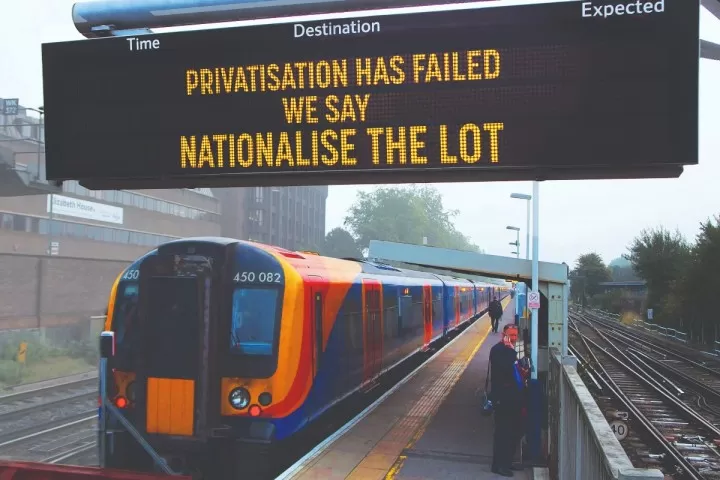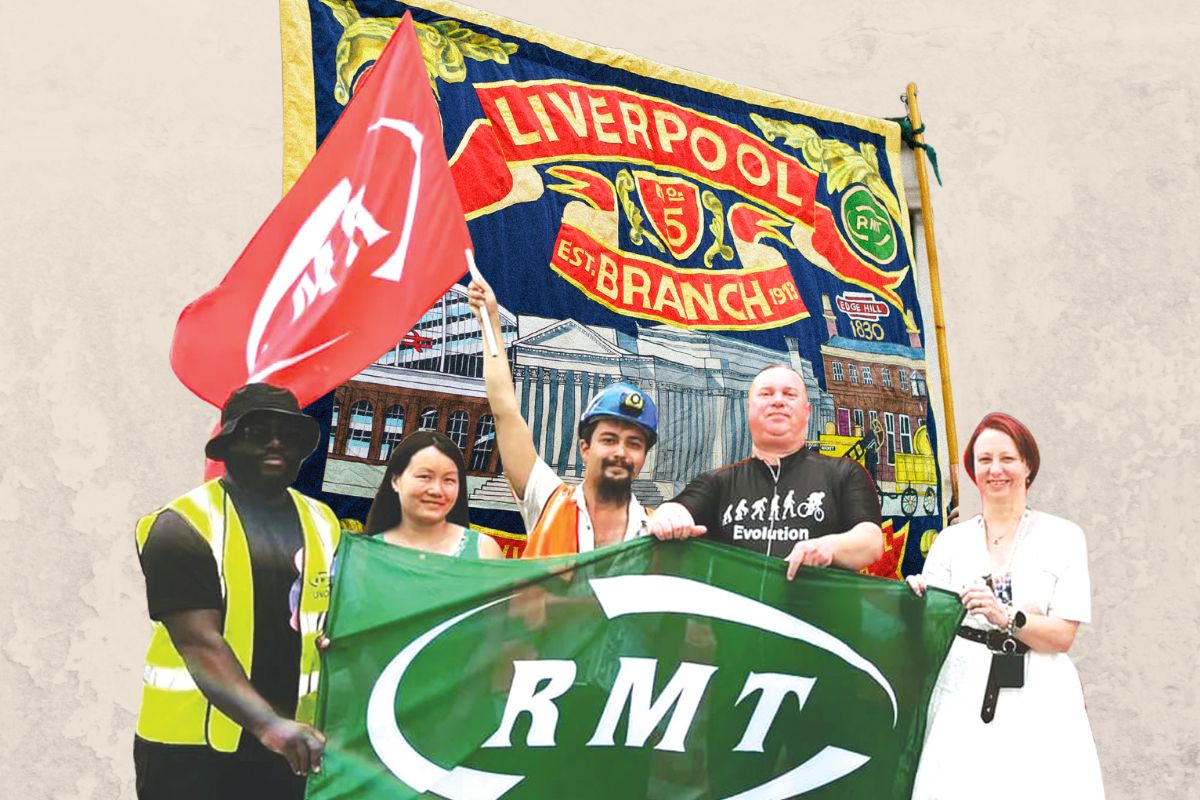Tens of thousands of workers on Britain’s railways are set to continue strike action from 18 to 20 August in their struggle for better pay and conditions. Their struggle is an inspiration to workers everywhere. Victory to the rail strikes!
From 18-20 August, the Rail, Maritime and Transport Union (RMT) will be carrying out its third round of national strike action in three months on the railways, as part of a dispute over jobs, pay, pensions, and conditions.
The strike will involve over 40,000 workers at 14 train operating companies (TOCs) and the infrastructure controller Network Rail (NR). Meanwhile 13,000 workers in London will bring the city’s transport to a standstill on 19 August, including RMT Tube and Overground workers, and Unite bus drivers.
Across the transport network and beyond, workers are being subjected to the same attacks. Despite the massive cost-of-living crisis, workers in transport are effectively being asked to accept a pay freeze or a real-terms pay cut.
So far, the 14 TOCs have made no offers at all. National Rail, meanwhile, has proposed a derisory pay rise of 4%, well below the RPI measure of inflation of around 12%. And even this offer has been made in exchange for a series of vicious cuts, including the lay-off of a third of the workforce.
On the Underground, meanwhile, Transport for London (TfL) bosses propose to lay-off 600 workers and cut pensions.
Cuts and privatisations

All of these cuts come down to an attempt by the Tory government – and standing behind them the capitalists – to increase profits at the expense of transport workers’ pay and conditions. In fact, these same bosses and Tories would gladly sacrifice the entire industry for the short-term gains of a parasitic cartel.
As Patrick, a Tube driver and RMT member, told us:
“I used to be a ticket office clerk. Every step of the way they wanted to kill [TfL]. They tried to defund the company first, to make the company unworkable. But the money is there.
“At some point they are going to say: ‘this doesn’t work, let’s privatise it’ – just like they did with British Rail. So it comes as no surprise to us: the plan is known and we have to fight against it.”
The same is true of the current cuts across the network. Rather than ‘modernising’ the industry, these attacks would merely cannibalise Britain’s already-archaic rail infrastructure, leading to inefficiencies, rising costs, and fatal danger to workers and passengers.
The recent disruptions on Avanti West Coast, described by Avanti bosses as ‘unofficial strike action’ are symbolic of this problem. In actual fact, the many train cancellations which caused havoc for travellers in mid-August had nothing to do with any planned or coordinated action.
In fact, workers simply refused to take on overtime shifts, owing to the exhausting conditions they have to work in. It is not their fault that the bosses have severely understaffed the service. Even working to the letter of your contract is enough to disrupt things, it seems!
As the cuts deepen, we can only expect such decay of the railways to get worse. As Patrick says of the Underground: “Ten years ago they cut 900 jobs and now they want another 600 to go – so when is enough going to be enough?”
Re-nationalisation

Meanwhile, the profits of the bosses have never been so high. The rolling stock companies – the parasites of parasites on the railway, who are responsible for the leasing of trains to the TOCs – extract hundreds of millions of pounds in dividends to shareholders each year. Their profits, as with those of the TOCs, are mostly owned by foreign rail monopolies and banks.
These profits are therefore entirely parasitic, serving no purpose for the investment needed to improve the conditions of workers, the service of passengers, and the economy as a whole. Yet it is on this altar that rail workers are being asked to sacrifice their pay, conditions, jobs, and safety. The prospect of an affordable and high-quality transport service is therefore scuppered in favour of their profits.
This is why the labour movement must demand the wholesale re-nationalisation of all these private companies and their profits, which have only been detrimental to the industry over the last 30 years of privatisation. Only by taking their wealth and resources back into public ownership and workers’ control can the demands of the strike be sustainably met.
The first two waves of rail strikes have sparked a powder-keg of indignation across the whole of the working class, which is now moving towards industrial action in the postal service, civil service, telecoms, education, hospitals, and more.
“A general strike is getting more and more realistic,” according to Patrick. “Consciousness is getting more radical, the workers are more open. We shouldn’t stop, we need to keep pushing.”
Coordination

Indeed, the mood for coordinated industrial action can be felt on all picket lines and in all workplaces. After all, these cuts are not isolated to the rail sector, or even the public sector. Workers across the board have been made to suffer over 14 years of crisis, pay freezes, and austerity, and are itching to fight back.
It is in this context that left trade union leaders – including Mick Lynch, Eddie Dempsey, and Dave Ward – have come together in the ‘Enough is Enough’ campaign to fight the cost-of-living crisis.
We support efforts to coordinate struggles in order to defend and improve living standards. The question is, where should these efforts go?
In our view, the first aim of any campaign across the trade unions must be to organise the rank-and-file around a far-reaching socialist programme, and to transform the labour movement into a fighting weapon to achieve this.
This should include the building of cross-union workplace committees, trades councils, and the shaking up of the TUC as a whole. Such steps could then act as a vehicle for the coordination of industrial struggles across various sectors, forging a mass movement against the bosses and the Tories.
Workers’ control
With such organisation, the working class could begin to feel its real strength. A one-day public sector strike, launched in this way, could be the opening shot of a cross-union campaign to bring down this Tory government and replace it with a socialist alternative.
The Avanti train disruptions and RMT strikes both demonstrate that not a wheel turns and not a lightbulb shines without the kind permission of the working class. Yet, under capitalism, it is the bosses who determine our conditions – and they will stop at nothing to protect their interests.
If the current disputes show anything, it is that we cannot settle for a simple redistribution of power or wealth. Rather, it is time to overhaul the whole system: for workers’ control of industry; for the expropriation of the banks and monopolies that dominate the economy; and for a socialist plan of production.
- Victory to the rail strikes!
- Fight for re-nationalisation and workers’ control!
- For coordinated action across the labour movement!






